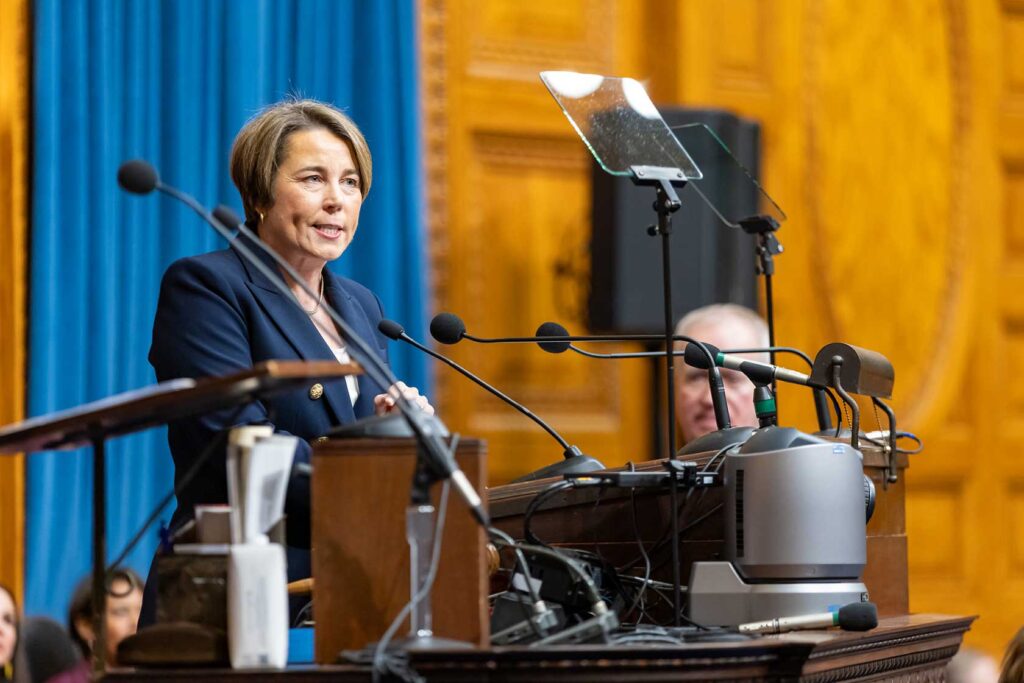Healey prioritizes early education in State of the Commonwealth address
Transportation, affordable housing also stressed

Governor Maura Healey’s proposal to boost universal early education in Massachusetts would expand access to state-affiliated pre-kindergarten for 4-year-olds, increase who is eligible for child care financial assistance and continue a state grant program supporting child care providers.
Healey initially announced the nearly $590 million proposal on Jan. 16, and pushed it again during her first State of the Commonwealth address the following day.
“We’re going to keep working — with businesses, providers, and the champions of child care in the legislature and across the state,” Healey said during the address. “Together, we will expand access, lower costs, and meet this child care challenge.”
Healey’s remarks came a week and a half after the governor announced a revenue shortfall and $375 million in budget cuts.
Healey peppered her speech with proposals for new or increased state spending. She said the budget she’s filing will feature investments in student literacy, services for vulnerable youth and improvements in “all the ways we get around in Massachusetts.”
In addition to expanding child care access, Healey also focused on affordable housing, and she proposed more funding for local roads and bridges and a boost for the MBTA, including creating a permanent reduced fare for low-income riders. She promised to keep housing affordable.

Gov. Maura Healey gives her State of the Commonwealth address at the State House. PHOTO: JOSHUA QUALLS/GOVERNOR’S PRESS OFFICE
She also highlighted the $1 billion tax cut policy she pushed for and ongoing state action around clean energy and responses to severe weather from climate change, such as the proposal of a permanent Disaster Relief Resiliency Fund.
The governor also highlighted the state’s MassReconnect program. Launched this year, it provides free community college education to students 25-years-old and older, and free school meals for students. Among the proposals in the speech was a nod to her “Gateway to Pre-K” plan.
Access to early childhood education and child care in the state is hampered by limited programs and steep costs. The average child care program in the state costs $1,600, according to a 2023 report from the Annie E. Casey Foundation.
A report from the Boston Opportunity Agenda found that in 2017, 35% of children up to age five did not have access to early education and care seats in their neighborhoods, and that during the pandemic the supply of child care dropped 16%.
Advocates for early childhood education said they see the benefits of Hailey’s proposal.
In Boston, when universal pre-K and early childhood education programs exist, they’re largely inaccessible to Black and Latino families, said Ruby Reyes, director of the Boston Education Justice Alliance.
She said they are often located far away from where families with young kids live and have too few seats to make them accessible to the city’s concentrations of children.
The system is also hampered by a lack of an established process to auto-enroll students, leaving families to figure out where the program is and how to apply.
The early childhood education proposal marks a major step forward, said Deb Fastino, director of the Common Start Coalition, which advocates affordable early childhood education and care.
She pointed to a proposed increase in the eligibility in the state’s Child Care Financial Assistance program, from its current level at 50% to 85% of state median income. The program supports families at or below the income limit to reduce how much they pay for child care based on household size and income. An increase was one part of a policy platform that the coalition has pushed for that was included in Healey’s proposal.
If approved, the plan would also expand the state’s Commonwealth Preschool Partnership Initiative, which funds school districts across the state to run and support free or affordable early childhood education programs in their communities.
Currently, the initiative operates in 12 Gateway cities and nine other districts, including Boston. The proposal would expand the program to all 26 of the Gateway cities by the end of 2026.
Greater access to universal early childhood education helps students gain interpersonal and social emotional skills that can better prepare them to enter elementary school, said Vatsady Sivongxay, executive director at the Massachusetts Education Justice Alliance.
“We know that meeting the child where they’re at, at a younger age, being able to identify their strengths and some of the opportunities to help them succeed at an early age really closes down the equity gap or the opportunity gap,” Sivongxay said.
Fastino said the governor’s proposal would create opportunities for more families to be eligible for [early] education and care programs for their children. “It’s the opportunity for more mixed-delivery providers to keep their doors open and provide better wages for their early educators,” she said.
Support for early childcare providers would come from continued funding to the state’s Commonwealth Cares for Children grant program, which was launched in 2021 and offers funding to early education and care providers to support operational and workforce costs.
Healey’s education proposals also included a promise to fully fund the Student Opportunity Act for a second year. The act, which was passed in 2019, funnels increased financial support to school districts across the state, with a particular focus on schools in low-income communities and with high numbers of low-income students.
Healey’s plan only marks the first step in a longer process to bring the changes into effect. Both the House and Senate will have the opportunity to field their own proposals before any one final policy is enacted.
“[My hope] is that our leaders are thinking about expanding universal high-quality preschool and integrating that into our kindergarten systems in our public schools,” Sivongxay said. “That’s where the majority of our low-income families are, so we need to meet them where they’re at.”
Material from GBH.com was used in this report.






